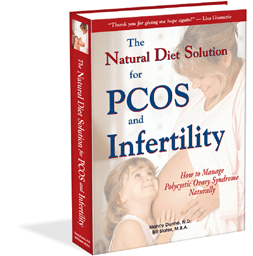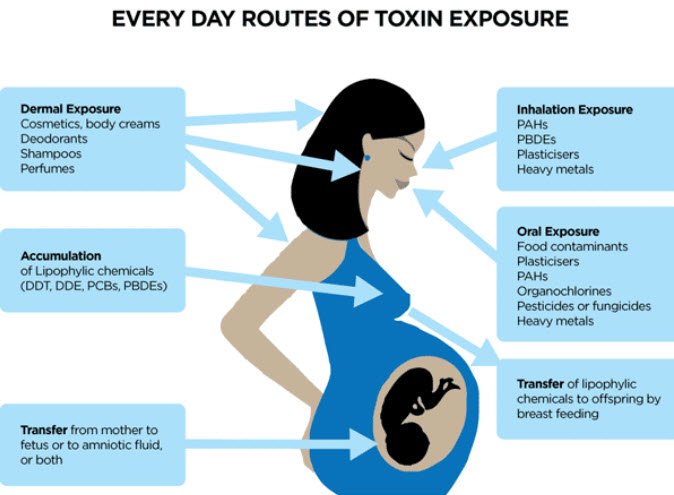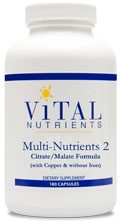10 Ways to Lose PCOS-Related Weight and Belly Fat
Obesity or persistent weight gain is a common feature of PCOS. Many women find it almost impossible to lose weight, even when on a strict diet…it seems that every calorie that is eaten is stored as fat. But there’s hope for losing weight with PCOS when multiple changes are addressed together. Weight loss may be slower than we’d like because of the syndrome, but progress really is possible if you work at it. Here are some positive steps you can take to lose weight.
Free PCOS Newsletter
1. Eat a Healthy PCOS Diet

The Natural Diet Solution e-book gives you a comprehensive and scientifically-proven diet plan for losing weight. A healthy diet means eating foods that are whole, fresh, and organic. Minimize consumption of refined, processed or fabricated foods. Minimize fast foods. Eat foods with a lower glycemic index. Emphasize vegetables, fruits, nuts and seeds. Preferred animal proteins are fish and poultry. What you eat can have a profoundly favorable effect on the hormones that govern your weight.
2. Eat Food with High Water Content
The water content of your food plays an important role in weight loss and in having a feeling of satiety after a meal. Water in the food itself is more effective at controlling appetite and losing weight than low-moisture food accompanied by a glass of water.
This concept has now been verified by a study of 1,136 women conducted by the University of Tokyo. The researchers discovered that the intake of water from foods was inversely associated with body mass index or waist circumference. In other words, the women consuming the most water in their foods were the leanest. The women consuming foods with the least water were the most overweight. Drinking water from beverages with meals had no impact on body mass index or waist circumference. For example, you can control weight better with a handful of 20 grapes rather than 20 raisins with a glass of water.
Source: Murakami K et al Intake from water from foods but not beverages, is related to lower body mass index and waist circumference in humans, Nutrition. 2008 Oct;24(10):925-32
3. Avoid All Foods and Beverages that Contain Added Fructose and Other Sweeteners.
High fructose corn syrup and other sweeteners are actually poisons that force you to be fat. The video below explains why.
If you intend to lose weight and keep it off, you'll want to stay completely away from all added sweeteners in foods and beverages.
4. Exercise and Be Physically Active.
Diet is essential for weight loss. But if you want to make your waist smaller, you will also need to exercise, according to a study at Syracuse University. In this study, 33 diabetic women were divided into "diet only" and "diet plus exercise" groups. Since diabetic women typically have belly fat problems similar to PCOS women, this study is of interest. Both groups -- diet only, or diet plus exercise -- had an average weight loss of 9.9 lbs over a 3 month span. Only the "diet plus exercise" group had a loss of visceral fat, which is the belly fat that surrounds internal organs – and that’s good news for recovering your health.
The University of California has reported that 41% of women with PCOS are couch potatoes. If you're in this group, find a way to get started with serious physical activity. A combination of cardio and muscle resistance exercises is recommended. Not only does exercise burn off fat, it also reduces insulin resistance.
Any exercise is good, but you'll want to devote some of your exercise to strengthening and toning your core muscles with floor exercises like pushups, sit-ups, planks, and active sports like tennis and horseback riding. The Natural Diet Solution ebook has an extensive chapter about exercise and how it helps you to lose weight, regain your fertility, and reduce other symptoms of PCOS. If you consistently exercise, you will see good results!
Sources: Giannopoulou I, et al, Exercise is required for visceral fat loss in postmenopausal women with type 2 diabetes, J Clin Endocrinol Metab, Dec 14, 2004
Kuchenbecker WK et al, In women with polycystic ovary syndrome and obesity, loss of intra-abdominal fat is associated with resumption of ovulation, Hum Reprod. 2011 Sep;26(9):2505-12.
5. Find Ways to Reduce Your Exposure to Chronic Stress.
Chronic stress increases cortisol, which is a stress-response hormone. Elevated cortisol is associated with insulin resistance and increased abdominal fat. Research from the University Hospital of Essen in Germany has shown that women with PCOS are more sensitive to stress than other women are. This means you're more likely to produce stress hormones like cortisol and thus encourage abdominal fat production. The Natural Solution for PCOS and Infertility e-book has an extensive chapter on how to manage stress. Take a look at that chapter for some stress reduction ideas.
6. Use nutritional supplements.
Food surveys conducted by the U.S. Dept. of Agriculture and other agencies consistently show that Americans consume a diet that is deficient in essential nutrients. Many people need to supplement their diet to aid overall health and help the body to balance hormones, which paves the way for successful weight loss.
What you should take, and how much, depends on your specific health conditions. Visit our Supplements page for more information about them. And remember, taking supplements can't help you very much unless you improve your diet and get regular exercise.
Eating right and getting enough activity are absolute prerequisites for successful, permanent weight loss. There are no exceptions to this rule, but there are supplements that can support you in the journey.
A study conducted at the Bastyr University Research Institute
investigated the association of long-term (10-year) use of 14
nutritional supplements with weight change over the past 10 years among
15,655 people 53-57 years old. Among overweight or obese men and women,
long-term use of multivitamins, vitamins B6 and B12, and chromium were
significantly associated with lower levels of weight gain. The results
of this study suggest that long-term users of certain supplements
experience less weight gain than individuals who do not use the
supplements.
Source: Nachtigal MC
et al,Dietary supplements and weight control in a middle-age
population, J Altern Complement Med. 2005 Oct;11(5):909-15.
7. Cut Out Toxins in Your Environment.
Environmental toxic chemicals disrupt your hormones and metabolism, damage organs that help manage your weight, and generally make healthy weight loss more difficult.

8. Consider Other Factors.
A number of additional weight loss factors are reviewed in this e-book, including food allergies and fatty liver degeneration.
One example is hypothyroidism; a high percentage of PCOS women have an underactive thyroid caused by an autoimmune disorder called Hashimoto's disease. This is an inflammatory disease where the immune system attacks the thyroid and destroys thyroid tissue. The result of a poorly functioning thyroid gland is a reduced metabolic rate and increased tendency to gain weight and be unable to take it off. Your doctor can diagnose you and tell you more about medication and dietary changes that may help.
9. Consult with a Naturopathic or Other Physician
If you have a weight problem, you know by now how hard it is lose weight and keep it off. We recommend that you work with a naturopathic doctor, medical doctor or other licensed health professional to develop the most appropriate weight loss program for your specific situation.
10. Join a PCOS Support Group.
You're much more likely to have success if you surround yourself with others who are supportive and encourage you to continue with healthy habits. In addition to family members, friends and health professionals, you might do some research to see if there are any PCOS support groups in your area. Many gyms also have a “buddy program” where you can find workout partners to keep you engaged and supported.
Related Articles
Get Answers to your Questions about
- Fertility
- Weight Control
- Hair Loss
- Stress
- Unwanted Hair
- Acne...and more!
FREE PCOS Report
and Newsletter

Your email is safe with us. We respect your privacy, and you may unsubscribe at any time.
Recent Articles
-
PCOS Long Journey to The Happy End
Apr 30, 18 07:24 PM
Hi Girls, Maybe my story will have one day a good end but I am not there yet. Until I was 31 years old I lived my dream, having lovely husband, good -
PCOS and Miscarriage
Apr 17, 18 04:03 PM
Proper diet and natural supplements can help the body maintain a pregnancy through successful delivery.
-
How to Deal with PCOS and Stress
Apr 04, 18 04:19 PM
Your body has a natural capacity to heal itself if you provide it with the necessary tools.






